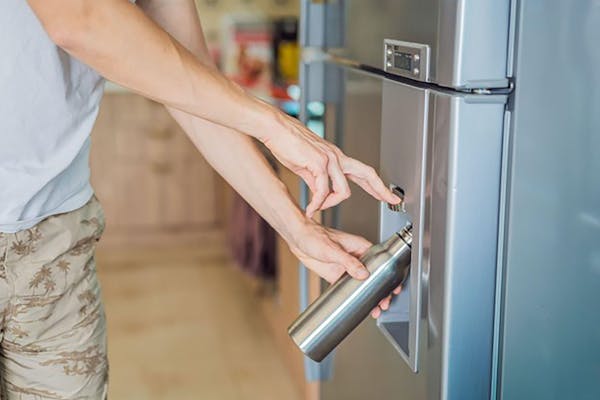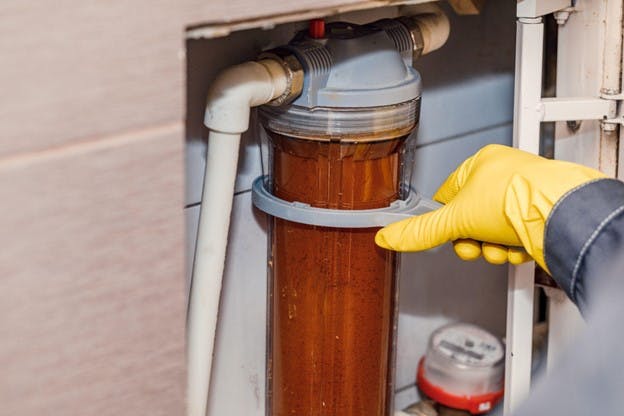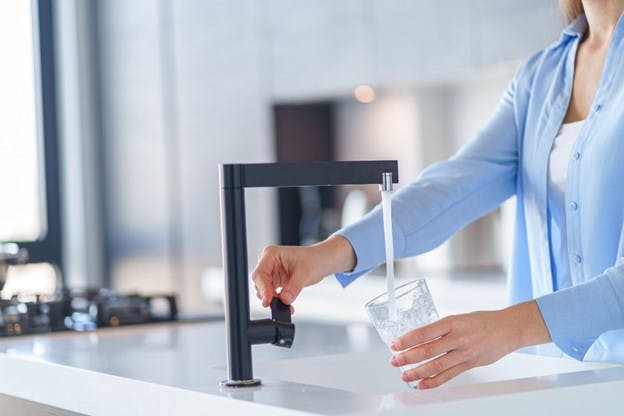🌟 New Arrival! Upgrade Your Water with Our Advanced Pitcher Filter. Shop Now
January 2024
Water Filter Lifespan 101: Keeping Your Drinking Water Clean
Clean water is the foundation of good health. As we become increasingly health-conscious, it’s no surprise that home water filters are growing in popularity. But, as with any product, water filters have a limited shelf life. Over time, they wear out. And when they do, that once clean, crisp glass of water you've grown to love might not taste so pure anymore. Speaking of, when was the last time you changed your water filter?
Water filters work behind the scenes in our homes, quietly removing contaminants and enhancing the taste and quality of our drinking water. While it doesn’t take a lot to keep them going, understanding your water filter’s lifespan and the factors that can influence it is a must.
In this article, we’re going to dive deeply into different types of water filters, the maintenance they require, and how long you should expect a water filter to keep giving you great-tasting water before it's time to toss it.
How Long Do Water Filters Last Before Needing to Be Replaced?
Just like there's no one-size-fits-all water filter, there's no one answer to how long a water filter will last you. So in order to answer this question, we’re going to have to look at the different types of water filters available to you. We’ll start with water filter pitchers and move on to more advanced multistage home filtration systems.
What Is the Lifespan of Water Pitcher Filters?
Water pitcher filters are popular due to their ease of use and low upfront cost. They usually have small, activated carbon filter cartridges which water is gravity-fed through. As water passes through the cartridge, chlorine and other water impurities are adsorbed into the surface area of the carbon until it can’t hold any more. As the filter ages, you’ll either notice that it takes much longer for water to pass through or that the taste of chlorine will return.
Because water pitcher filters use small cartridges, they tend not to last very long. The most popular commercial brands say you should get rid of the old filter after two months or 40 gallons of water have passed through it. After that, they're no longer certified to perform as advertised. Of course, you should always check the manufacturer recommendations for the best results.
Some models have indicator lights which are meant to tell you if your filter is still good. It's important to know that these only reflect the number of pours and don't actually check your filter. They also assume you only pour 8 ounces of water, even though most glasses are 12 ounces or more. If you’re regularly pouring more than 8 ounces of water, you’ll do better to mark your calendar than to use the indicator light.
What Is the Lifespan of Refrigerator Water Filters?
If your refrigerator comes with a built-in water dispenser and ice maker, there’s a good chance it will need a filter replacement every now and then. Typically, refrigerator water filters use a combination of a sediment pre-filter and activated carbon filter media to remove impurities and give you a convenient source of clean-tasting, filtered water and ice. Refrigerator filter systems are often designed to remove contaminants like chlorine, pharmaceuticals, VOCs, and heavy metals like lead.
Like other water filtration systems, these filters’ lifespans are finite. Many manufacturers suggest replacing refrigerator water filters every six months to ensure the best quality. Keep in mind this recommendation assumes average use and takes into account the filter's capacity to trap contaminants before water quality diminishes. However, if your household has very high water usage or if the water supply has higher levels of contaminants, you may need to replace your filter more frequently.
To help you stay on top of it, many refrigerator models feature a filter change indicator light that activates based on time and/or the amount of water filtered. While these are usually more advanced than the water pitcher filter indicators, it’s good practice to be aware of changes in water taste or decreases in water flow rate. These can be signs that you may need a new filter sooner than you anticipated.
What Is the Countertop Filter Lifespan?
Countertop water filters are a convenient solution for those who want a middle ground between the simplicity of a pitcher filter and the more extensive filtering capabilities of under-sink systems. They’re generally easy to install because they connect directly to your faucet.
Depending on the model, the system can clean your tap water using a variety of technologies, from activated carbon to more advanced methods like reverse osmosis or UV filtration. Countertop filters are capable of removing a wide variety of contaminants, including bacteria and viruses, which are beyond the reach of most pitcher filters.
Our HomeWater Countertop Water Dispenser offers three stages of filtration to reduce chlorine, bacteria, organic matter, bad taste, and odor. It also gives hot and cold water on demand.
The filter lifespan of a countertop water system depends on the type of filter technology it uses and the volume of water filtered. Generally, you can expect a countertop filter to last anywhere from three to twelve months before needing a replacement. However, the actual time can vary based on your water usage and the specific contaminant levels in your water supply.
As with other filters, manufacturers often provide usage guidelines, but it’s smart to monitor the water flow rate and taste. Some countertop units come equipped with indicators to alert you when it’s time to change the filter. This can help take the guesswork out of maintenance schedules.
What Is the Lifespan of an Under-Sink Water Filter?
Under-sink water filters are an increasingly popular addition to modern kitchens. They offer a continuous supply of purified water while staying conveniently out of sight. These systems connect directly to the water line, delivering filtered water through a dedicated tap or integrating with your existing faucet. While the installation under the sink can be more involved than a countertop filter, it allows you to have great-tasting filtered water without taking up any of your precious counter space.
The water filter lifespan of an under-sink filter largely depends on the technology it uses. Basic models using just carbon filters may need a replacement every six to twelve months. More sophisticated multistage units that incorporate reverse osmosis, sediment filters, post filters or water polishers might need replacement at different intervals. Some components, like the RO membrane, don’t need to be replaced more than once every two years under normal use conditions.
Water usage patterns and the quality of your municipal or well water supply are critical factors that can impact the frequency of filter replacements. A higher volume of water use or a heavier load of contaminants will shorten the filter's lifespan. Always check with the user manual or the manufacturer’s website for specific instructions and filter lifespans.
What Is the Whole-House Water Filter Lifespan?
If you want top quality water for drinking, cooking, bathing, or laundry, there is no better option than the whole-house water filtration system. These point-of-entry systems filter the water before it gets into your home’s pipes rather than just before it exits your faucet.
A whole house water filter system such as the HomeWater Upstream Water Filter typically consists of a series of filters that each target different contaminants, from sediment and rust to chlorine and pesticides. The first stage usually involves a sediment pre-filter, which captures larger particles and protects the rest of the system from clogging. Following this may be activated carbon filters, water softeners, or reverse osmosis systems.
The lifespan of a whole house filter system's components varies. Sediment pre-filters might require replacement every three to six months, while the main filter media, like carbon filters, can last from six months to a year, depending on usage and the level of contaminants. Specialized filters have their own timelines. Making sure to replace each filter as needed is vital to the health of your system, as each stage in the filtration process relies on the one before it for maximum efficiency.
Water quality plays a significant role in the maintenance schedule of a whole-house system. If you're drawing well water with a lot of sediment or other contaminants, you'll likely need to replace filters more frequently. Conversely, municipal water users might find their filters last longer due to the treatment the water receives before it reaches their home.
A noticeable drop in water pressure throughout the house or visible sediment in the filter could suggest your water filter needs to be changed. For the most accurate filter lifespan and water filter maintenance schedule, always follow the recommendations provided by your system's manufacturer.
What Factors Can Affect a Water Filter’s Lifespan?
The primary factor that determines a water filter’s lifespan is the amount of contaminants it's captured. This means heavy usage or poor water quality can significantly shorten the life of your filter. But there's more to it than that.
If you have very high water pressure or you're running very hot water through the filter, it can degrade faster. Likewise, improper system maintenance can also decrease your filter's lifespan. Be sure to always follow the manufacturer’s instructions, backwash when necessary, and replace or clean pre-filters on time to enjoy better quality water for longer.
How Do I Know When It's Time to Replace a Filter?
The signs that it's time to replace a water filter can vary depending on the type of filter and the specific contaminants it's designed to capture. That said, here are foolproof ways to know it's time to replace your filter:
- Scheduled replacement: Follow the manufacturer's recommended schedule for filter changes. This is often based on time or the amount of water filtered.
- Change in taste or odor: If your water starts tasting or smelling different, it may be a sign that the filter is no longer effectively removing contaminants.
- Slow water flow: A decrease in the water flow rate might mean that the filter is clogged with debris and needs to be replaced.
- Filter change indicator: Many modern filtration systems have indicators that alert you when it’s time to change the filter.
- Visual inspection: Look for signs of sediment build-up or discoloration in the filter cartridge.
- Water testing: If your water quality tests poorly, it might be a sign that the filter is no longer working.
Can Using a Filter Beyond Its Lifespan Have Negative Effects?
Yes, using a water filter past its lifespan can compromise your water quality. Once a water filter is too old or saturated to remove contaminants, it could begin to release captured contaminants back into your water. This problem can be compounded by bacteria growing in the filter or the materials of the filter itself breaking down and entering your water.
Beyond water quality, the filter may become clogged and reduce your water flow or the added sediment the filter might release could shorten the life of your water-using appliances. Staying on top of these regular filter changes will keep top-quality water flowing from your faucet.
Maintain Your Water Filters for the Best Quality Water
Water filters work in the background to provide great-tasting water you feel good about drinking. But like all products you buy, water filters need proper maintenance and care. Understanding your water filters' lifespans and replacing them when needed can ensure your filter keeps giving you the water you want.
If you’re ready to see just how clean and delicious your tap water can be with minimal maintenance and not worrying about whether your filter is still performing at its top level,, HomeWater can help. The HomeWater UPSTREAM™ 4-Stage Whole Home Water Filter uses advanced catalytic carbon to remove pesticides, herbicides, THMs, chlorine, chloramines, hydrogen sulfide, volatile organic compounds, PFOS/PFAS, heavy metals, turbidity, sediment, dirt, rust, and microplastics.
You’ll rest easy knowing you have the safest and best-tasting water every time you turn on your tap.
Related Articles
December 2023


